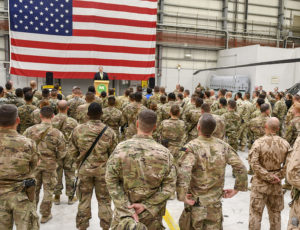
U.S. Secretary of State Michael R. Pompeo visits troops in Kabul, Afghanistan on July 9, 2018. [State Department photo/ Public Domain]
Prince first brought his proposal to the White House early last year, reportedly with the backing of Trump’s then-adviser Stephen K. Bannon. It was quickly rejected by Mattis and then-national security adviser H.R. McMaster, who were pushing for a plan, ultimately approved by Trump, to increase U.S. forces.
Trump “was close to making a decision in our favor last year” and was reluctant about the McMaster strategy, Prince said in an August interview with the Hill newspaper. “And so now that the anniversary [of the new strategy] is coming up yet again . . . the question is, does [Trump] default to the same failed policies of the last 17 years, or does he exercise civilian leadership of the military and go to a sustainable path?”
Bannon is now gone from the White House, but so is McMaster and former secretary of state Rex Tillerson, who joined Mattis in trying to shut the door permanently on Prince.
Prince’s appearance last week in Afghanistan came as the new top U.S. officer there, Gen. Scott Miller, began carrying out an informal review of the U.S. mission. The Pentagon is not expected to recommend major changes to the strategy adopted last year, which moderately increased the number of U.S. troops to more than 14,000, loosened restrictions on airstrikes and called for a stricter stance toward neighboring Pakistan’s alleged support for terrorism and provision of sanctuaries to the Taliban.
In recent months, the administration has pressed for reconciliation with the Taliban, sending senior officials to meet with their representatives in Qatar and appointing veteran diplomat Zalmay Khalilzad, the former U.S. ambassador to Afghanistan, as its special envoy tasked with jump-starting talks between the militants and the Afghan government.
Among others during his visit, according to several officials and informed individuals in Kabul, Prince met with Ghani’s current and former intelligence chiefs, the current interior minister and his deputy, as well as a number of senior officials, some of whom left government in disputes with Ghani.
In a lengthy interview last week on Afghanistan’s Tolo TV, Prince sharply criticized U.S. strategy, particularly the frequent rotation of American units, as well as what he described as the use of conventional tactics against an unconventional enemy and the lack of dependable air cover. Instead, he outlined a contractor force of about 6,000, drawn from former U.S. and European special forces, 3,600 of whom would be designated as “adjuncts” to Afghan units on the ground, serving under Afghan rules of engagement.
If the contractors did something wrong, he said, they should be prosecuted under American military law. Prince took sharp exception to the Tolo interviewer’s description of the contractors as “mercenaries,” saying they would not count as such under an unspecified “United Nations definition.”
Prince has put the cost of his plan, which he has said would leave about 2,000 U.S. Special Operations troops on the ground and utilize contractor aircraft, at about $5 billion a year. Within six months, he told Tolo, “you would have a very different situation on the ground. I will commit to that.”
Read more here.





